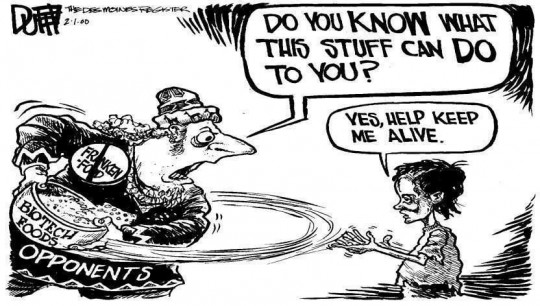 A new report out of the U.K. shows just how muddled discussion on genetically modified crops really is. Late last week the U.K. House of Commons Science and Technology Committee published: “Advanced genetic techniques for crop improvement: regulation, risk, and precaution.” Very broadly, this report set out to look at the “challenge of feeding a burgeoning global population, using few resources,” specifically the use of GMOs, as well as the “EU’s current regulatory regime for genetically modified organisms (GMOs).”
A new report out of the U.K. shows just how muddled discussion on genetically modified crops really is. Late last week the U.K. House of Commons Science and Technology Committee published: “Advanced genetic techniques for crop improvement: regulation, risk, and precaution.” Very broadly, this report set out to look at the “challenge of feeding a burgeoning global population, using few resources,” specifically the use of GMOs, as well as the “EU’s current regulatory regime for genetically modified organisms (GMOs).”
The report acknowledges that no single type of food can end the difficulties feeding the global population; however, “novel crops could play an important role in helping tomorrow’s farmers to produce more from less.” The report found major obstacles keeping innovations like this from wider use:
The EU’s current regulatory regime for genetically modified organisms (GMOs) threatens to prevent such products from reaching the market, both in the UK, in Europe and, as a result of trade issues, potentially in the developing world.
The committee found three major flaws in this current “regime:”
- Current law assumes that GMOs are inherently more dangerous than crops produced by any other technique.
- Potential risks of GMOs are assessed without regard to potential benefits to producers, consumers, and the environment.
- Individual governments are not allowed the authority to make their own decisions about GMOs.
The report directly calls for a less biased approach to discussing GMOs: “We urge those with a view about GM to be honest about the reasons for those views and not cloak value-based opposition in scientific terms.” Chair of the Committee, Andrew Miller MP commented further on this:
Opposition to genetically modified crops in many European countries is based on values and politics, not science. The scientific evidence is clear that crops developed using genetic modification pose no more risk to humans, animals or the environment than equivalent crops developed using more ‘conventional’ techniques.
Unfortunately, the way the EU’s regulatory system works means that countries opposed to genetically modified crops can block their growth in other countries. This has driven research activity out of the EU and put at risk the UK’s ability to be a global player in advancing agricultural technology.
Regulatory reform is no longer merely an option, it is a necessity. To meet the huge challenge of feeding a burgeoning global population, using fewer resources, as our climate becomes increasingly unstable, we will need to use all of the tools at our disposal, be they social, political, economic or technological.
The committee makes several points in its conclusion, but I want to focus on just a couple. GMOs won’t necessarily solve any and all global food problems, but rather “a diversity of approaches–technological, social, economic, and political–will be required to meet the challenge of delivering sustainable and secure global food production. However, advanced genetic approaches do have a role to play.” It accuses the EU and U.K. government of misleading the public by consistently “framing genetic modification alongside other novel, controversial, or potentially harmful technologies…shut[ing] down opportunities for wider debate.”
Genetically modified organisms may help developing nations improve their crop yields thereby greatly reducing world hunger; they could help farmers devastated by natural disasters to quickly get back on their feet; they could cause significantly less damage to the environment than other technologies and methods of growing crops, and more. There may be real risks with GMOs, but until the debate is open and honest we may never really understand what the actual risks are and what GMOS contribute to the global food economy.This technological innovation has the potential to greatly improve the prosperity of millions of people and yet the debate has been hijacked by emotions and fears.

